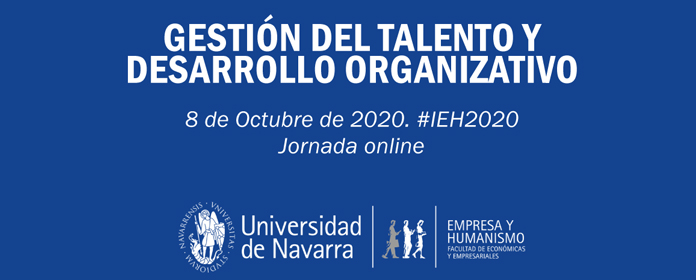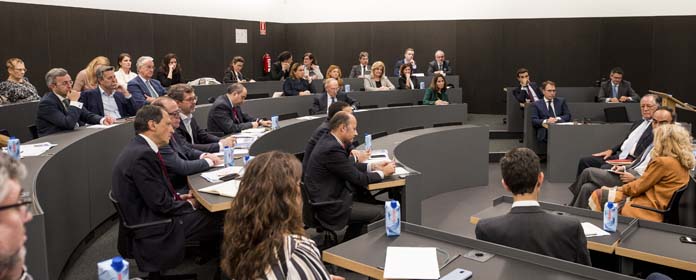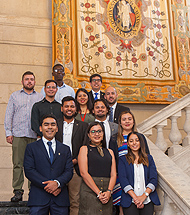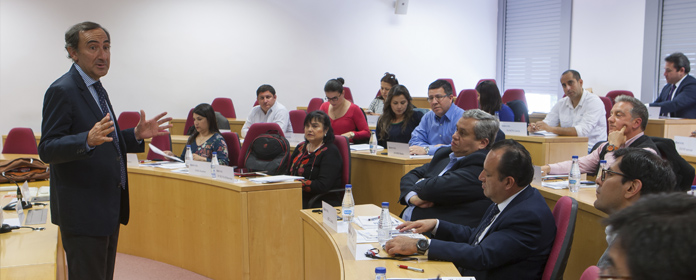Eva Piera: “Los modelos de banca responsable también tienen un impacto positivo en la cifra de negocio”
La directora global de Relaciones Institucionales de BBVA imparte una conferencia en el Instituto Empresa y Humanismo
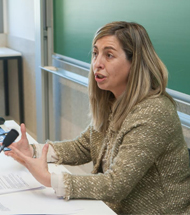
“La ética es el propósito de tener a las personas en el centro del modelo de negocio, lo que implica que la autorregulación va mucho más allá de lo que exige la ley”, defendió Eva Piera, directora global de Relaciones Institucionales de BBVA en el campus de la Universidad de Navarra, en una conferencia organizada por el Instituto Empresa y Humanismo.
Piera participó como ponente en la Semana de Actualización del Instituto, que se desarrolla entre el 2 y el 6 de mayo bajo el tema general Empresa y Bienes Públicos.
La directiva explicó el modelo de “rentabilidad basada en principios” del BBVA, que tiene como guías “la integridad, la transparencia y la prudencia”, basadas en una comunicación “transparente, clara y responsable”. El objetivo es, por supuesto, prestar un mejor servicio a los clientes y al conjunto de la sociedad, pero también “la reconstitución de la confianza y la credibilidad perdidas por el sector bancario en los últimos tiempos”, explicó.
Y es que el impacto de la anterior crisis no fue solo económico para la industria bancaria. “Crisis va a haber siempre, pero se trata de llegar preparados para ellas. En el pasado, familias han tomado malas decisiones financieras que han causado mucho sufrimiento. No es lo mismo entrar en una crisis sobreendeudados que no, sabiendo que los trabajos no son para toda la vida. No evitaremos las crisis, pero sí parte de las consecuencias más gravosas”, argumentó.
Por eso, el BBVA ha desplegado toda una batería de herramientas de comunicación orientadas a incidir en la educación financiera. “Es un asunto que está en el frontispicio de las agencias públicas de los organismos internacionales”, subrayó.
De ahí surgen iniciativas como el Día de la Educación financiera en España, que remarca la importancia de la planificación, el ahorro y la información en la gestión económica familiar. También el plan Mi jubilación, que ha simulado más de 2.400.000 jubilaciones desde 2013. “Y no es solo para vender pensiones, es un modelo de banca responsable: que tome decisiones informadas, y que luego el cliente contrate con la entidad que le dé la gana”, recalcó.
Productos con alto impacto socialJunto con la educación financiera, que también incluye a PYMES y negocios, donde “una mala decisión financiera puede condicionar la viabilidad de un proyecto empresarial”, BBVA trabaja con “productos de alto impacto social”: colectivos con necesidades especiales, inversión socialmente responsable e inclusión financiera, especialmente en Iberoamérica. “La idea es hacer llegar a todos las posibilidades de esta nueva era. Acceso universal a una cuenta y a productos financieros. No tiene un sentido mercantilista, sino de ayuda a gestionar mejor sus riesgos: dónde ahorrar, medios de pago alternativos al efectivo, acceso al crédito y los seguros, y un sistema regulado, que proporciona protección”, explicó Piera.
Como no podía ser de otra manera, BBVA se apoya en el potencial de las nuevas tecnologías para llegar a esos públicos: “Hacen mucho más fácil satisfacer necesidades, ya que somos más eficientes. Aumenta la escalabilidad de los costes y permite ofrecer servicios más adaptados a cada caso”.
De ahí surgen realidades como las microfinanzas: “Facilitamos el acceso al crédito a microemprendedores que están en la base de la pirámide. 6.591.000.000 euros prestados y más de 1.700.000 emprendedores atendidos en 2015, 83% de ellos en situación de vulnerabilidad; eso es impacto social”, sentenció.

